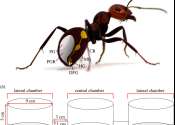Ant pheromones may help protect hikers and campers from ticks
If you're outside enjoying the spring sunshine, then chances are, ticks are too. However, new research from Simon Fraser University (SFU) suggests the use of ant pheromones as a topical repellent, or as an environmental barrier, ...









